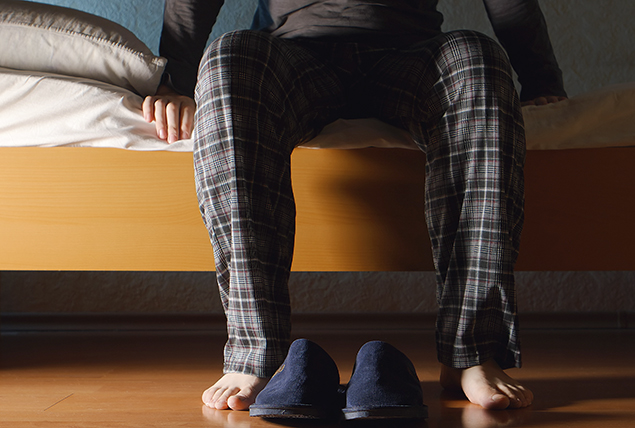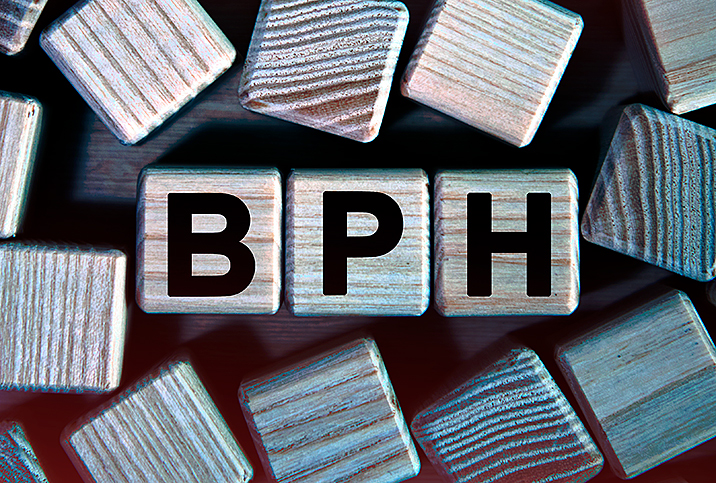How Is BPH Diagnosed and Will It Affect My Sexual Health?

Benign prostatic hyperplasia (BPH) is a condition that primarily affects older men, in which the prostate gland increases in size. It isn't inflammation due to an infection; that's prostatitis. BPH is a natural development.
What are the symptoms and how is BPH diagnosed? How will BPH affect sexual health?
What is BPH?
BPH is a common condition that actually affects almost all men if they live long enough. While the causes of BPH haven't been fully explained, it is believed that once men reach age 40 or so, the natural reduction in testosterone production may cause the prostate gland to grow larger. The condition is not cancerous, nor does it put you at higher risk of the disease.
However, BPH and prostate cancer do share some common symptoms.
The prostate gland sits just below the bladder and partially surrounds the start of the urethra. As such, when it becomes enlarged, it may pinch down on the urethra and cause issues with urination and ejaculation.
What are the symptoms of BPH?
The primary feature of BPH—the one that usually brings its presence to light—is its effect on urinary and ejaculatory function. Because of this, the urological community is developing language for discussing these issues. They are leaning more into talking about what's been termed "lower urinary tract symptoms (LUTS) secondary to BPH" as opposed to just bundling all of this under the heading BPH.
It may seem like a minor distinction, but it's important for two reasons. One, some men have BPH but no symptoms or symptoms that are so mild they opt not to treat the condition unless it gets worse.
The second reason is it's the urinary tract symptoms that are the actual problem for most men, not the growth of the prostate gland itself. After all, the word benign appears in the name.
The American Urological Association (AUA) literature on the topic refers to the real issue as "direct bladder outlet obstruction (BOO)," which is secondary to BPH. Urologists are thus largely focused on helping their patients choose the best approach to alleviating those symptoms and improving their quality of life. That may or may not involve directly treating the enlarged prostate itself.
The most common symptoms of LUTS/BPH include the following:
- Dribbling or slowness when urinating
- Trouble getting your stream started
- Urinary incontinence (leaking)
- A sudden need to urinate
- A need to get up in the night to urinate
- Never feeling like your bladder is empty
- Pain with ejaculation or when urination
- The color of your urine changes
- A different, stronger odor to your urine
How is BPH diagnosed?
The initial exam for potential LUTS/BPH may include a digital rectal exam to see if the prostate feels larger than normal. Providers can sometimes use these exams to make an educated guess as to whether prostate cancer might be present. At the very least, they can determine if further cancer testing is warranted.
Hard spots on the gland that they can feel as they press on it through the rectum wall may be an indication.
Other tests for BPH may include the following:
- A urine flow test to see how fast your stream is coming out
- A study that measures how much urine is left in your bladder after you empty it
- A cystoscopy to examine your bladder from the inside
"Every urologist is going to do the evaluation a little differently," said Amy Pearlman, M.D., a men's health specialist and co-founder of Prime Institute in Fort Lauderdale, Florida. "When I work men up for enlarged prostate, what I do is I image the prostate, and I go in with a scope [cystoscopy]. And I typically get a pelvic ultrasound because you just put a probe on the lower abdomen, and you can get pretty good images in most people of the size of the prostate."
Because treatment options depend on general prostate size, a precise measurement of the gland isn't necessary.
"We're just looking for a ballpark size," Pearlman said. "So that [ultrasound] gives me the size of the prostate. And I use cystoscopy to check for any scar tissue in the urethra, because some of these guys can have an enlarged prostate and scar tissue, and that might dictate what type of prostate surgery I'm able to do. For some surgeries, you have to get a larger scope in the urethra, and a lot of scar tissue might not accommodate that."
Finally, Pearlman looks to see if part of the prostate is pushing into the bladder, a condition called an intravesical median lobe, and checks the health of the bladder itself.
"Can I see a lot of muscle fibers that suggest the bladder's been working really hard? And I don't want to see any lumps and bumps in the bladder that are concerning," she said. "I don't like surprises in the operating room. Some of these guys can have a bladder tumor and an enlarged prostate."
How does BPH affect sexual health?
The sexual health effects of LUTS/BPH are often treated as an afterthought to the urinary health aspects of it, but they can be impactful.
For starters, if you experience pain when you ejaculate—often the case for men with a significantly enlarged prostate—that's bound to have effects on the way you experience sexual pleasure. It could even lead to psychological issues that could contribute to erectile dysfunction (ED).
Another possible sexual side effect of LUTS/BPH is the chronic discomfort that may accompany a condition in such a nerve-rich area. Referred pain is something that happens when pain in one body part gets misinterpreted by your nervous system as occurring in another. For instance, an enlarged, inflamed prostate may be felt in the testicles or result in penis pain or an ache in the perineum.
All of these sensations can affect sexual function.
The biggest LUTS/BPH contributor to sexual health issues is the medication used to treat it. Some, such as alpha-reductase inhibitors (finasteride and dutasteride), may contribute to ED. Others, such as alpha blockers, may cause retrograde ejaculation, which occurs when semen goes back into the bladder rather than out of the urethra.
"While it's not dangerous, it can be very bothersome for people," Pearlman said. "There's another class of medications called alpha-reductase inhibitors. They can also cause sexual side effects like ED."
Be careful if you decide to go on one of these drugs—even if it's just for hair loss.
"There's a lot of research coming out about what's being called post-finasteride syndrome, where a lot of people who take these medications—and it could even be at a lower dose for male-pattern hair loss—that even after stopping the medication, some people report that their side effects persist," Pearlman said. "It's one thing if we put someone on medication and take them off and the side effects go away, but what if those side effects don't go away?"
Pearlman advises potential LUTS/BPH patients to be sure to do some research on these medications and ask their healthcare providers plenty of questions because there are many options.
"Patients really need to be counseled about being on these alpha-reductase inhibitors and how that can potentially permanently cause issues," she said.


















